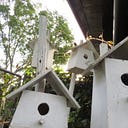Member-only story
Animal Farm and the Art of the Allegory
Forget the Russian Revolution
Tolkien famously “dislike[d] allegory in all its manifestations”. Allegory constrains the powers of imagination that multiply meaning, he thought. Such broad strokes of literary criticism, however, shrivel in light of a master — and Orwell is nothing but.
Orwell’s allegory is distinguished by its skill and subtlety, its imbibed philosophy, but above all by its universality: there is something in Animal Farm which holds true for every age, nation, and person. That is because its author has not forgotten to tell a good story.
Subtitled “A Fairy Story”, Animal Farm is first of all about hope, striving, and betrayal. It is both delightful and poignant in its simplicity, as with the very best children’s books. And like any good story, it is founded on, if not complex, at least vibrant and lifelike characters. Forget analogies of the Russian Revolution — these are human types, representing reactions and instincts that operate inside us. Boxer is the will made flesh; Mollie is vanity; Clover exhibits blind empathy; Napoleon is the tyrannical ego. There is something of the human condition here, in the Sisyphean task Boxer shoulders, the cryptic indifference Benjamin displays, or the unshakeable hope of the animals. That is say, the human spirit, its optimism and endurance, are at the…
